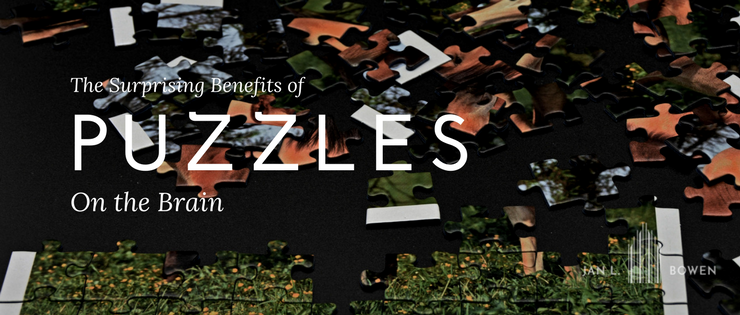
So many of us turn to puzzles or problem solving as a way to relax. Crossword and word puzzles, jigsaw puzzles, mysteries, and other brain games are all used as a way to relax. What is the inherent trait of a puzzle or a problem that soothes, even while they present a new type of challenge? Puzzles captivate us at the same time they taunt us with challenges.
While the hands are busy, the mind can wander — or focus
While we work on puzzles, our hands are occupied while at a deeper level our brain is sorting and making sense of random patterns. We aren’t consciously aware of this work. In fact, we’re focused more on images and shapes, which are frequently more pleasurable.
Puzzles engage the brain
- Puzzles engage the brain by provoking thought and vocabulary, urging us to conceptualize language in ways we might not typically use in daily conversation.
- Regular use of puzzles has real psychological benefits, including:
Improved memory
Short-term memory is enhanced as clues are retained for solving puzzles. Imagination is also stimulated as the bigger picture is incorporated.
Heightened creativity
Every innovative and creative idea we have in solving puzzles adds to healthy brain functioning. This type of thinking often leads to innovative, precognitive, and efficient problem-solving skills over all.
Integrated brain utilization
Solving puzzles and problems require both logical skills and creativity, utilizing diverse brain functioning. This integrated approach results in both more effective and in more profound and sustainable understanding.
Dopamine production
The neurotransmitter, dopamine, is produced when doing puzzles. Dopamine assists in our ability to concentrate, be optimistic, have confidence and increase memory.
Meditation
Perhaps the busy hands, calm mind best explains the meditative impact puzzles have but research shows that puzzles do in fact simultaneously activate our brains while relaxing us psychologically. They put our brains into a meditative state.
They’re relaxing
- There’s no shortage of options with puzzles. You can choose between images of jigsaw puzzles of dream vacations, future goals, ultimate house depictions, etc. Time spent working on a jigsaw puzzle can be effectively visualizing a future goal, seeing the end result.
- People approach puzzles in different manners yet all appear to relax them. Whether they systematically organize the puzzle shapes before starting or dump the pieces in a pile and random chose until they find a fit — the result is a satisfying and relaxing sigh.
But the benefits aren’t limited to jigsaw, crossword, and brain puzzles.
I think we do puzzles because we have a relentless urge to create order out of chaos.
An example profile
A profile in the Life of Purpose series, Carol Cox, uses structure in every aspect of her business.
She may not do traditional puzzles but she solves problems. She creates structures. If you observe how she applies this in her business it is clear that solving problems is a mode of functioning for her and a key component of how she creates her life of purpose. Puzzles may not be her recreational choice, but her life has fallen into its own pattern of puzzle pieces.
Carol loves systems. She was a web programmer who created two software companies. Her beginning as an entrepreneur continued with more patterning of order and structure as she continued with teaching business and marketing in a university. From that stage of her career, she continued as a political analyst and speaker, and formed her company, Speaking Your Brand, helping women craft their message to build their life and their business.
All of the businesses and responsibilities Carol had required structured thought, patterns, — and slides. Hundreds and hundreds of organized presentations and slides. What a puzzle to unravel all those different scenarios into organized initiatives with specific approaches and strategies.
The structure Carol creates is a scaffold — it provides the support needed to supply missing pieces and order from chaos.
Problems provide meaning
With each speech Carol gives and each client she helps, she creates a structure and framework that is, in fact, an elegant puzzle. Perhaps it’s not a puzzle that you would buy in a store but it contains pieces that are all part of the whole and within themselves, each have meaning. She has created the framework and the structure to support each individual need (i.e., puzzle/problem).
To many, a PechaKucha would be a puzzle. To Carol, it is a puzzle with specific structure and rules that she understands and teaches others how to follow. If you’re curious about this, just listen to Carol’s podcast, Episode 3 where she not only explains exactly what a PechaKucha is but how to create one. (After listening, I can now just about pronounce it.)
For answers to so many puzzles — including how to put pieces in place and lessons on what structure fits which occasion — subscribe to Carol’s podcast, join her community, and get her guide with her step-by-step framework on how to craft your message. Wherever you find Carol, you will find valuable resources, framework, and answers to your puzzles.





Hi Jan, I’ve been designing, making and researching the benefits of puzzles for the past 30 years.
I’ve just read your article ” THE SURPRISING BENEFITS OF PUZZLES ON THE BRAIN” Thank you so much for highlighting the many benefits of puzzles.
My pleasure! Thanks for reading and commenting. I was happy to learn about “your world” of puzzles! and the far reaching impact they have. Before writing my article, I just enjoyed them as a past time. So thank you for the contribution you make to all of us!